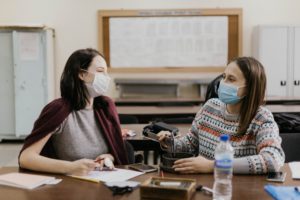
A little over a year ago, I was participating in Exponent Philanthropy’s Weekly Funder Discussions on Zoom, talking about the role philanthropy could play during the coffee and blankets stage of the pandemic. From my peers, I learned about being flexible in grant terms, the importance of listening well, and the need for open communications with grantees. This led to the Longview Foundation doing more things differently than at any other time in our history.
As we get back to our new normal, it’s clear the pandemic has taken a toll on those most vulnerable. I’m curious what this new recovery stage means for our philanthropic communities. Longview is spread across 50 states and partners with state departments of education, school districts, nonprofits and universities, all working toward equipping the next generation with the knowledge and skills necessary to thrive in our shared global future.
Federal relief from the American Rescue Plan
The educators I talk to are both exhausted and invigorated. Yes, financial assistance from the government is making a difference, but administrators are weary. The American Rescue Plan (ARP) Act, signed into law in March, included $122 billion for the ARP Elementary and Secondary School Emergency Relief (ARP ESSER) Fund. This is an unprecedented influx of financial support to education across states and districts, but big decisions must be made quickly.
Over the summer, public school districts submitted plans on how they’d spend relief dollars to the state. States then had to submit their own plans to the U.S. Department of Education. Some of my peers had no idea these decisions were being made. They asked, with so much money coming into our school systems, does education still need us? I’d argue they need us now more than ever.
How to help locally
School districts are encouraged to get community input as this money is spent over the next three years. With the right partnerships, these funds could transform education systems for years to come.
Here are a few ways small, place-based funders can help local school systems use federal relief dollars in smart and strategic ways:
- Strategic planning: In most communities, districts need strategic planning support around leveraging recovery dollars. Small philanthropies that have established relationships with school systems can offer expertise, or the money to find it. There needs to be a balance for building capacity while also addressing immediate needs.
- Out of school learning: Are you funding an amazing summer or afterschool program? Let your district know about the impact it’s had, and if it has the capacity to grow. You can learn more about summer learning and enrichment here.
- Educator pipeline: Urban and rural communities’ alike struggle with attracting and retaining educators. See the Association of Teacher Colleges and Universities recommendations for using stimulus funds to address this challenge.
- Social and emotional learning, along with mental health and safety: This is a regular theme in my conversations with colleagues, trustees and grantee partners. Even if you haven’t supported K-12 education, philanthropies with grantees in the mental health space might consider doing so now.
- Supporting families with returning to in person school: Students have been back in buildings for a month or longer now. Even though we are back to school, there are still health risks for educators and students. It is important to partner with districts to effectively communicate the importance of in person learning and to support the safety precautions needed to keep students and educators safe while balancing understanding and responding to parental concerns.
Keep in mind
As always, relationships matter. The depth of your relationship with your local school system may impact how open officials are to your suggestions. Similarly, the Education Counsel says it’s important to identify options, not just one way. And move where you have experience.
There’s still much uncertainty around this stage of relief. I look forward to continuing to learn from you about how you’re continuing to support and serve the education systems in your communities. Our collective contributions around promising practice are amplified when we all learn from each other as we move through this phase of supporting education in this pandemic.
Jennifer Manise is executive director at the Longview Foundation.
